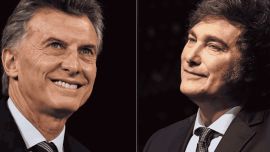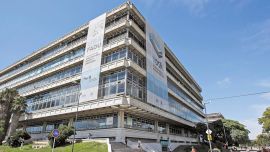This year’s voting begins in earnest with tomorrow’s provincial elections in Neuquén and Río Negro and these remain the core theme of today’s column, but it’s impossible to ignore the fireworks over this city’s electoral system which formed such a dominant component of this week’s news. First some comment on that (and also a couple of other campaign developments), before making the trip down south.
---
Was City Mayor Horacio Rodríguez Larreta inspired by the Oscar-winning film Everything Everywhere All at Once when he came up with his “concurrent” system for national and local voting? Was his strategic clash with PRO party founder and ex-president Mauricio Macri a deplorably inept and potentially suicidal display of disunity from a coalition calling itself Juntos (por el Cambio), or was it an accident which had to happen since Rodríguez Larreta feels he must shake off any image of a puppet presidency at all costs after Alberto Fernández? And is it all about egos in presidential and mayoral races – Rodríguez Larreta versus PRO chair Patricia Bullrich, Jorge Macri versus Radical Senator Martín Lousteau – or are deeper issues at stake?
The clash between PRO hawks and doves is commonly presented as over whether the structural reforms over which all agree are best achieved by a fast track or gradualism and consensus (not that the future Congress will be any less tricky an obstacle to negotiate for either, regardless of whether the reformer speaks softly or carries a big stick), but winning the election comes before governing. Will the party ignore at its peril the massive groundswell against a state which is “everything, everywhere all at once” (while failing to be the estado presente), as PRO hawks might argue? Or will talking Javier Milei’s talk only give people added reasons to vote for the libertarian maverick, with the low-hanging fruit lying in the traditional electoral battleground of the middle, disenchanted moderates who have found no home in the Frente de Todos government? Underlying those questions is whether PRO defines itself as a party or as the member of a coalition trying to keep its allies on board when making electoral decisions.
But instead of entering into these deeper conceptual questions of identity, most reactions within the party have degenerated into backbiting over who is breaking the rules. Almost all PRO leaders point the finger at the mayor since his “concurrent” dual ballot (electronic municipally, paper nationally) does not correspond to the regime of the last general elections in 2019. But Rodríguez Larreta can argue that he is only being true to the City’s electoral code legislatively approved in 2018, rather than trying to hurt Jorge Macri or help Lousteau – this code was not applied the following year because it was blithely ignored by then-president running for re-election Macri, who could not afford the luxury of splitting any ballot, desperately needing any vote he could scrape. If we add that Lousteau in 2018 opposed the code for which he has now been pressing so ardently, pretty much everybody seems to come across as a hypocrite, while also washing their dirty linen in public and jeopardising the unity of a party and coalition stagnant in the opinion polls for several months now as it fails to address the real problems.
No room for any more if space is to be found for the Patagonian elections, nor to balance the opposition tensions with pointing out the infighting within the ruling Frente de Todos coalition – always highly visible but now made official this month by Interior Minister Eduardo ‘Wado’ de Pedro’s confirmation of contested Peronist primaries, which he underlines to be exclusively a presidential decision, blaming the “one-man show” of Alberto Fernández. Nor would any account of opposition disunity be complete without mention of Mendoza PRO leader Omar De Marchi’s exit (strongly opposed by his own national party chair Patricia Bullrich) from Cambia Mendoza, the Radical-dominated local chapter of the Juntos coalition, but the Patagonian priority dictates that further details might be best left to closer to the Mendoza provincial elections (not until September with primaries in June).
---
The twin Patagonian provinces of Neuquén and Río Negro vote tomorrow and will thus occupy the remainder of this column. Precious little about these elections in a national press dominated by the PRO spats at the time this column was written in midweek for various reasons. While tomorrow is indeed the kick-off for significant 2023 voting, the domination of both districts by provincial parties does not make them much of a barometer for the polarisation obsessing Argentine politics or a national trendsetter to help forecast the presidential race. Secondly, they are sparsely populated – according to the 2022 census, Río Negro has 762,067 people (589,251 voters) and Neuquén 726,590 (with 546,166 of them eligible to vote), barely three percent of the Argentine population, sharply up from the start of the century when they had just over a million people between them but still well short of La Matanza when combined.
Neuquén is a palindrome, which means that it spells the same backwards as forwards (ignoring the accent, of course) – by the same token, no matter which way the vote is held, every election has resulted in the victory of the Neuquén Popular Movement (MPN, in its Spanish acronym) ever since its foundation in 1961. In its first years it was a neo-Peronist movement since Peronism was banned but on the return of Peronism to legality in 1973 (and more permanently in 1983) it refused to return to the umbilical cord, cutting its own very successful way.
This unbroken streak is not expected to end tomorrow with the party’s nominee Marcos Koopman sitting on a sometimes double-digit lead and poised to succeed Governor Omar Gutiérrez on the back of the Vaca Muerta shale boom. In theory Koopman’s victory should be clinched by an opposition split mirroring Mendoza or this city. The official Juntos por el Cambio gubernatorial candidate is the pro-Lousteau Radical deputy Pablo Cervi, but ex-president Macri has thrown his support strongly behind a rogue MPN deputy Rolando Figueroa running for a new party called Comunidad. A couple of opinion polls have even given Figueroa the lead and the lack of PASO primaries injects an element of uncertainty into tomorrow’s result. The other four gubernatorial candidates are all given single digits by the opinion polls with libertarian Carlos Eguía favoured for third place, Cervi and Kirchnerite Ramón Rioseco representing the two main national coalitions fighting it out for fourth and leftist Patricia Juré trailing.
Even less space for Río Negro but there should be scope for more on both provinces when analysing the results next Saturday. Once and future governor Alberto Weretilneck (this columnist had to Google that name) was an obscure politician of the Frente Grande (tiny despite its claim) when Peronist Governor Carlos Soria being shot dead by his wife at a New Year’s Party to greet 2012 propelled the then-lieutenant-governor to the top. He has not looked back since nor is likely to do so now with approval ratings topping 50 percent. Weretilneck has eight rivals who are not worth scrutiny now, although their performance tomorrow will be included in next Saturday’s column. One difference with Neuquén is that the divisions here are sharpest in Peronist not national opposition ranks with the Soria clan backing one horse and La Cámpora led by Senator (and aspiring Council of Magistrates member blocked by the Supreme Court) Martín Doñate another.
Anyway Río Negro is owed a whole lot more space in next week’s column.






















Comments